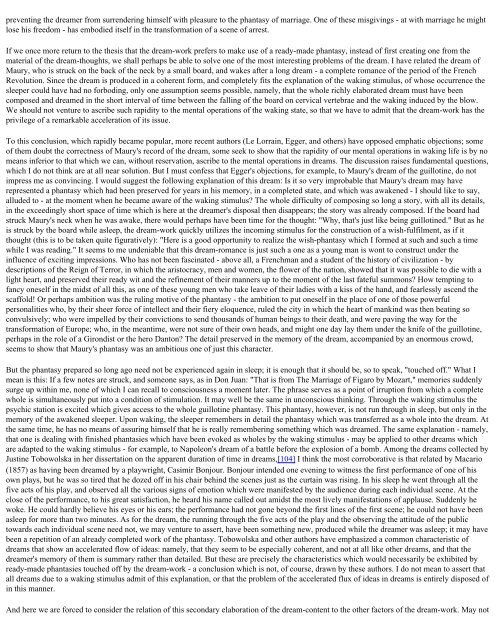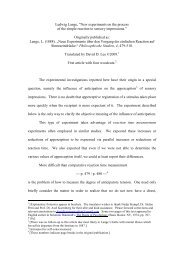The Interpretation Of Dreams Sigmund Freud (1900) PREFACE
The Interpretation Of Dreams Sigmund Freud (1900) PREFACE
The Interpretation Of Dreams Sigmund Freud (1900) PREFACE
Create successful ePaper yourself
Turn your PDF publications into a flip-book with our unique Google optimized e-Paper software.
preventing the dreamer from surrendering himself with pleasure to the phantasy of marriage. One of these misgivings - at with marriage he might<br />
lose his freedom - has embodied itself in the transformation of a scene of arrest.<br />
If we once more return to the thesis that the dream-work prefers to make use of a ready-made phantasy, instead of first creating one from the<br />
material of the dream-thoughts, we shall perhaps be able to solve one of the most interesting problems of the dream. I have related the dream of<br />
Maury, who is struck on the back of the neck by a small board, and wakes after a long dream - a complete romance of the period of the French<br />
Revolution. Since the dream is produced in a coherent form, and completely fits the explanation of the waking stimulus, of whose occurrence the<br />
sleeper could have had no forboding, only one assumption seems possible, namely, that the whole richly elaborated dream must have been<br />
composed and dreamed in the short interval of time between the falling of the board on cervical vertebrae and the waking induced by the blow.<br />
We should not venture to ascribe such rapidity to the mental operations of the waking state, so that we have to admit that the dream-work has the<br />
privilege of a remarkable acceleration of its issue.<br />
To this conclusion, which rapidly became popular, more recent authors (Le Lorrain, Egger, and others) have opposed emphatic objections; some<br />
of them doubt the correctness of Maury's record of the dream, some seek to show that the rapidity of our mental operations in waking life is by no<br />
means inferior to that which we can, without reservation, ascribe to the mental operations in dreams. <strong>The</strong> discussion raises fundamental questions,<br />
which I do not think are at all near solution. But I must confess that Egger's objections, for example, to Maury's dream of the guillotine, do not<br />
impress me as convincing. I would suggest the following explanation of this dream: Is it so very improbable that Maury's dream may have<br />
represented a phantasy which had been preserved for years in his memory, in a completed state, and which was awakened - I should like to say,<br />
alluded to - at the moment when he became aware of the waking stimulus? <strong>The</strong> whole difficulty of composing so long a story, with all its details,<br />
in the exceedingly short space of time which is here at the dreamer's disposal then disappears; the story was already composed. If the board had<br />
struck Maury's neck when he was awake, there would perhaps have been time for the thought: "Why, that's just like being guillotined." But as he<br />
is struck by the board while asleep, the dream-work quickly utilizes the incoming stimulus for the construction of a wish-fulfilment, as if it<br />
thought (this is to be taken quite figuratively): "Here is a good opportunity to realize the wish-phantasy which I formed at such and such a time<br />
while I was reading." It seems to me undeniable that this dream-romance is just such a one as a young man is wont to construct under the<br />
influence of exciting impressions. Who has not been fascinated - above all, a Frenchman and a student of the history of civilization - by<br />
descriptions of the Reign of Terror, in which the aristocracy, men and women, the flower of the nation, showed that it was possible to die with a<br />
light heart, and preserved their ready wit and the refinement of their manners up to the moment of the last fateful summons? How tempting to<br />
fancy oneself in the midst of all this, as one of these young men who take leave of their ladies with a kiss of the hand, and fearlessly ascend the<br />
scaffold! Or perhaps ambition was the ruling motive of the phantasy - the ambition to put oneself in the place of one of those powerful<br />
personalities who, by their sheer force of intellect and their fiery eloquence, ruled the city in which the heart of mankind was then beating so<br />
convulsively; who were impelled by their convictions to send thousands of human beings to their death, and were paving the way for the<br />
transformation of Europe; who, in the meantime, were not sure of their own heads, and might one day lay them under the knife of the guillotine,<br />
perhaps in the role of a Girondist or the hero Danton? <strong>The</strong> detail preserved in the memory of the dream, accompanied by an enormous crowd,<br />
seems to show that Maury's phantasy was an ambitious one of just this character.<br />
But the phantasy prepared so long ago need not be experienced again in sleep; it is enough that it should be, so to speak, "touched off." What I<br />
mean is this: If a few notes are struck, and someone says, as in Don Juan: "That is from <strong>The</strong> Marriage of Figaro by Mozart," memories suddenly<br />
surge up within me, none of which I can recall to consciousness a moment later. <strong>The</strong> phrase serves as a point of irruption from which a complete<br />
whole is simultaneously put into a condition of stimulation. It may well be the same in unconscious thinking. Through the waking stimulus the<br />
psychic station is excited which gives access to the whole guillotine phantasy. This phantasy, however, is not run through in sleep, but only in the<br />
memory of the awakened sleeper. Upon waking, the sleeper remembers in detail the phantasy which was transferred as a whole into the dream. At<br />
the same time, he has no means of assuring himself that he is really remembering something which was dreamed. <strong>The</strong> same explanation - namely,<br />
that one is dealing with finished phantasies which have been evoked as wholes by the waking stimulus - may be applied to other dreams which<br />
are adapted to the waking stimulus - for example, to Napoleon's dream of a battle before the explosion of a bomb. Among the dreams collected by<br />
Justine Tobowolska in her dissertation on the apparent duration of time in dreams,[104] I think the most corroborative is that related by Macario<br />
(1857) as having been dreamed by a playwright, Casimir Bonjour. Bonjour intended one evening to witness the first performance of one of his<br />
own plays, but he was so tired that he dozed off in his chair behind the scenes just as the curtain was rising. In his sleep he went through all the<br />
five acts of his play, and observed all the various signs of emotion which were manifested by the audience during each individual scene. At the<br />
close of the performance, to his great satisfaction, he heard his name called out amidst the most lively manifestations of applause. Suddenly he<br />
woke. He could hardly believe his eyes or his ears; the performance had not gone beyond the first lines of the first scene; he could not have been<br />
asleep for more than two minutes. As for the dream, the running through the five acts of the play and the observing the attitude of the public<br />
towards each individual scene need not, we may venture to assert, have been something new, produced while the dreamer was asleep; it may have<br />
been a repetition of an already completed work of the phantasy. Tobowolska and other authors have emphasized a common characteristic of<br />
dreams that show an accelerated flow of ideas: namely, that they seem to be especially coherent, and not at all like other dreams, and that the<br />
dreamer's memory of them is summary rather than detailed. But these are precisely the characteristics which would necessarily be exhibited by<br />
ready-made phantasies touched off by the dream-work - a conclusion which is not, of course, drawn by these authors. I do not mean to assert that<br />
all dreams due to a waking stimulus admit of this explanation, or that the problem of the accelerated flux of ideas in dreams is entirely disposed of<br />
in this manner.<br />
And here we are forced to consider the relation of this secondary elaboration of the dream-content to the other factors of the dream-work. May not



